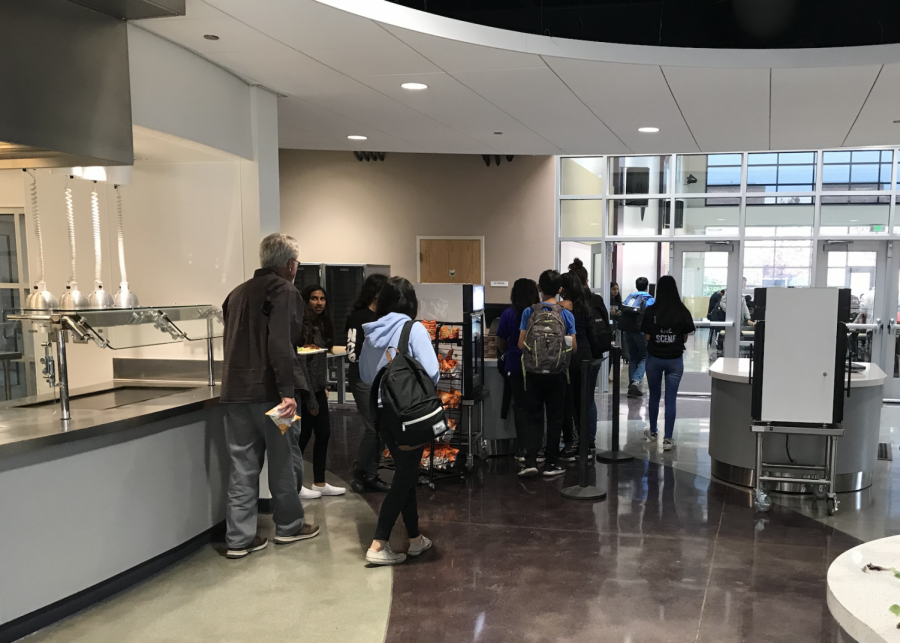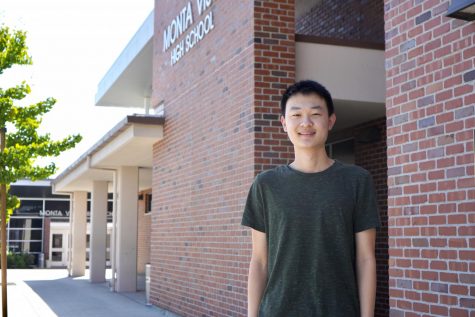Analyzing the effects of declining cafeteria sales
New 2018-2019 bell schedule leads to decreasing lunch sales and a change in students’ meal patterns
Cafeteria sales have declined since the 2017-2018 school year.
November 9, 2018
The new 2018-19 bell schedule has led to drastic changes in lunch line sales, compared to last year’s numbers. According to Food Services Manager Debbie Herrera, brunch sales this month have increased by 1,000 meals, compared to last year in September. Lunch sales, however, have decreased by nearly 3,000 meals. Herrera correlates falling sales with the modified schedule that shifted lunch times back, leading to changes in students’ hunger and dining patterns.
According to Herrera, state regulations state that anytime after 10:30 is considered lunch time, and with students just finishing brunch during that time, many choose to avoid purchasing a full lunch later.
“[The new schedule] has a huge impact,” Herrera said. “Because there isn’t a huge difference in hours between your classes, you guys are still full [from brunch], so because of the lunch time change, we actually dropped in sales by a couple hundred students throughout the month that are not buying lunch as much as they were last year.”
Sophomore Arul Saxena acknowledges the effects of the later lunch time, believing it has directly impacted his academic performance.
“I’m always hungry during fourth and fifth periods especially,” Saxena said. “Sometimes this hunger does distract me. For example, today, I had a test and I couldn’t focus simply because I was hungry.”
In order to combat hunger during his classes in between brunch and lunch, Saxena finds himself consuming different quantities of food to best accommodate the new schedule.
“At brunch time, I end up eating a lot more food than I did last year,” Saxena said. “I also end up eating more food at lunch than last year.”
For sophomore Jason Yip, changing his eating times helps him remain full and focused during class, warding off the negative effects of the new schedule.
“I don’t eat much breakfast, so I can get quite hungry during 4th and 5th period,” Yip said. “As a result, eating my main lunch at brunch feels more comfortable to me and besides, lunch is too late.”
Sophomore Akash Dasgupta also notices the effect of the later lunch time, but he believes students manage the hunger and try their best to stay focused in class.
“People feel hungrier,” Dasgupta said. “Personally, I eat the same amount of food [at lunch].”
Herrera believes falling sales may not be solely a result of a later lunchtime. External factors, such as the weather, can also affect consumption patterns.
“During the week, we can go 3,100 in one day, and we can go down to 2,400 on one day,” Herrera said. “It all depends on you guys: if you are are in a mood like ‘Oh, the menu is this today, we’re going to have [this], let’s go.’ Three weeks ago, we had fish, and we sold out. Today, we didn’t. And then the weather — when it’s cold, you guys eat in here, and when it’s hot, it’s like ‘I’m just gonna have an ice cream, chips and a drink.’”
Aside from declining sales, the later lunch time has also complicated the cafeteria’s production habits. Changes in sales left the cafeteria no choice but to improvise in hopes of reaching a more efficient amount of production.
“We’re just getting onboard this year as to our cost-efficiency: what is it costing us to do a later lunch, versus the menu, because the menu changes every year,” Herrera said. “Right now, we’re eyeballing it on how much we’re serving.”
Ultimately it is still early in the year, and there are too many factors at hand to conclude whether the later lunchtime is causing schools to lose money. In addition, some students decide to avoid noticing their hunger and put focus on their classes to distract themselves from the implications of the new schedule.
“Eating in class does not distract me from focusing on the work at hand,” Dasgupta said. “[As] for the food, we forget about it after a while.”


















